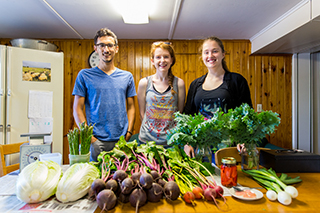Campus garden and compost project

Five EMU campus gardens, pioneered years ago by a professor hoping to give students a practical exercise in sustainability, now provide fresh, organic produce.
Garden locations
- Mt. Clinton Garden, on the corner of Mt. Clinton Pike and College Avenue
- Kitchen Garden, on the east side of Northlawn
- Dogwood Garden, on Dogwood Drive across from the University Commons parking lot
- East Side Garden, just south of the arboretum.
- Gnagey Garden, just north of the Dogwood Garden
Students and community members organized by the Sustainable Food Initiative volunteer and maintain the gardens throughout the year. Students also manage the university compost pile.
Professors use the garden and compost areas in EMU’s Peace with Creation curriculum and for studying sustainable agriculture, crop chemistry and worldwide sustainability and development.
Lessons in sustainable agriculture
Hands-on experience in sustainable agriculture was one of many outcomes Peter Dula, department chair of Bible and Religion Department, had in mind when he began the campus gardens initiative in 2008.
A member of the Creation Care Council food procurement task force, he knew an organic garden was the most affordable and efficient way to supply the campus with healthy, locally grown food.
Students turned the idea into reality, working year-round as volunteers to develop the yield and expand the space.
Within the first year, the garden harvest stocked the cafeteria’s salad bar during Summer Peacebuilding Institute.
The dining hall now hosts a "local harvest meal" each fall. Large portions of the menu come from the campus garden.
The Dining Hall
- saves about 350,000 gallons of hot water per year by going tray-less
- recycles all paper and recyclables
- offers “greenware" containers instead of Styrofoam
- uses recycled paper products from a local distributor
Compost initiative
 Student workers and volunteers transport 300-500 pounds of dining hall scraps a day
across campus via bicycle and maintain the compost piles, which are located behind
the Suter Science Center and monitored by the Virginia Department of Environmental
Quality. The student-led initiative has provided rich compost soil for campus gardens
since 2008.
Student workers and volunteers transport 300-500 pounds of dining hall scraps a day
across campus via bicycle and maintain the compost piles, which are located behind
the Suter Science Center and monitored by the Virginia Department of Environmental
Quality. The student-led initiative has provided rich compost soil for campus gardens
since 2008.


